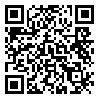Mon, Feb 2, 2026
| فارسی
Volume 30, Issue 1 (Continuously Updated 2024)
IJPCP 2024, 30(1): 0-0 |
Back to browse issues page
Download citation:
BibTeX | RIS | EndNote | Medlars | ProCite | Reference Manager | RefWorks
Send citation to:



BibTeX | RIS | EndNote | Medlars | ProCite | Reference Manager | RefWorks
Send citation to:
Zargarani N, Azadfallah P, Farahani H. Psychometric Properties of the Persian Version of Embodied Sense of Self Scale. IJPCP 2024; 30 (1) : 1899.1
URL: http://ijpcp.iums.ac.ir/article-1-4066-en.html
URL: http://ijpcp.iums.ac.ir/article-1-4066-en.html
1- Department of Psychology, Faculty of Humanities, Tarbiat Modares University, Tehran, Iran.
2- Department of Psychology, Faculty of Humanities, Tarbiat Modares University, Tehran, Iran. ,azadfa_p@modares.ac.ir
2- Department of Psychology, Faculty of Humanities, Tarbiat Modares University, Tehran, Iran. ,
Abstract: (2735 Views)
Objectives The purpose of this study was to investigate the psychometric properties of the Persian version of Embodied Sense of Self Scale (ESSS).
Methods This is a psychometrics study. Participants were 215 Iranian people (160 females and 55 males with a mean age of 33.34±10.81) who were different based on age, education level, marital status and place of residence. They were selected from the general population by a convenience sampling method in 2020-2022. After translating the Persian version of the ESSS, it was completed by the participants online, along with the dissociative experiences scale II (DES-II) and the prosocial tendencies measure (PTM). Data were analyzed in SPSS sifwaer, version 27 and R version 4.3.2 Lavaan package using confirmatory factor analysis (CFA), the average variance extracted (AVE), Pearson correlation test, Cronbach’s alpha coefficient, and McDonald’s omega coefficient.
Results The three-factor structure of the scale was not confirmed by the CFA but the two-factor solution (agency and narrative) had good fit. The AVE values for agency, narrative, and overall scale were 0.45, 0.52, and 0.42, respectively. The correlation coefficient of narrative and agency domains with subscales of DES-II were in the range of 0.33-0.55. The correlation values of agency and narrative with subscales of PTM were in the range of 0.17-0.30. The Persian ESSS had good convergent validity but had low divergent validity. Cronbach’s alpha values for narrative and agency subscales were 0.86 and 0.83, respectively and McDonald’s omega values were 0.84 for both subscales, indicating the good internal consistency of the two-factor structure of the Persian ESSS.
Conclusion The Persian version of the ESSS with two subscales has acceptable validity and reliability for Iranian samples; however, exploratory factor analysis is needed to reach optimum validity.
Methods This is a psychometrics study. Participants were 215 Iranian people (160 females and 55 males with a mean age of 33.34±10.81) who were different based on age, education level, marital status and place of residence. They were selected from the general population by a convenience sampling method in 2020-2022. After translating the Persian version of the ESSS, it was completed by the participants online, along with the dissociative experiences scale II (DES-II) and the prosocial tendencies measure (PTM). Data were analyzed in SPSS sifwaer, version 27 and R version 4.3.2 Lavaan package using confirmatory factor analysis (CFA), the average variance extracted (AVE), Pearson correlation test, Cronbach’s alpha coefficient, and McDonald’s omega coefficient.
Results The three-factor structure of the scale was not confirmed by the CFA but the two-factor solution (agency and narrative) had good fit. The AVE values for agency, narrative, and overall scale were 0.45, 0.52, and 0.42, respectively. The correlation coefficient of narrative and agency domains with subscales of DES-II were in the range of 0.33-0.55. The correlation values of agency and narrative with subscales of PTM were in the range of 0.17-0.30. The Persian ESSS had good convergent validity but had low divergent validity. Cronbach’s alpha values for narrative and agency subscales were 0.86 and 0.83, respectively and McDonald’s omega values were 0.84 for both subscales, indicating the good internal consistency of the two-factor structure of the Persian ESSS.
Conclusion The Persian version of the ESSS with two subscales has acceptable validity and reliability for Iranian samples; however, exploratory factor analysis is needed to reach optimum validity.
Article number: 1899.1
Type of Study: Original Research |
Subject:
Psychiatry and Psychology
Received: 2023/12/2 | Accepted: 2024/07/14 | Published: 2024/08/19
Received: 2023/12/2 | Accepted: 2024/07/14 | Published: 2024/08/19
| Rights and permissions | |
 |
This work is licensed under a Creative Commons Attribution-NonCommercial 4.0 International License. |






